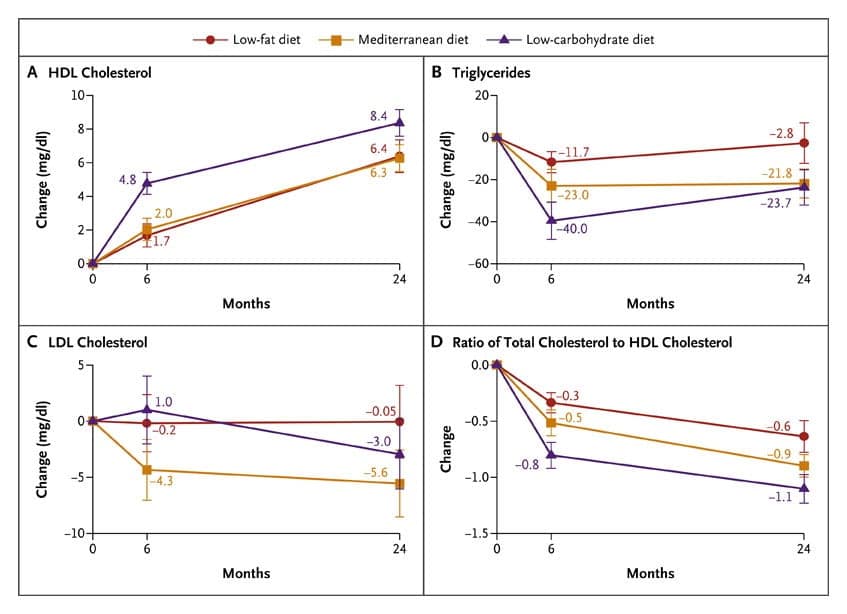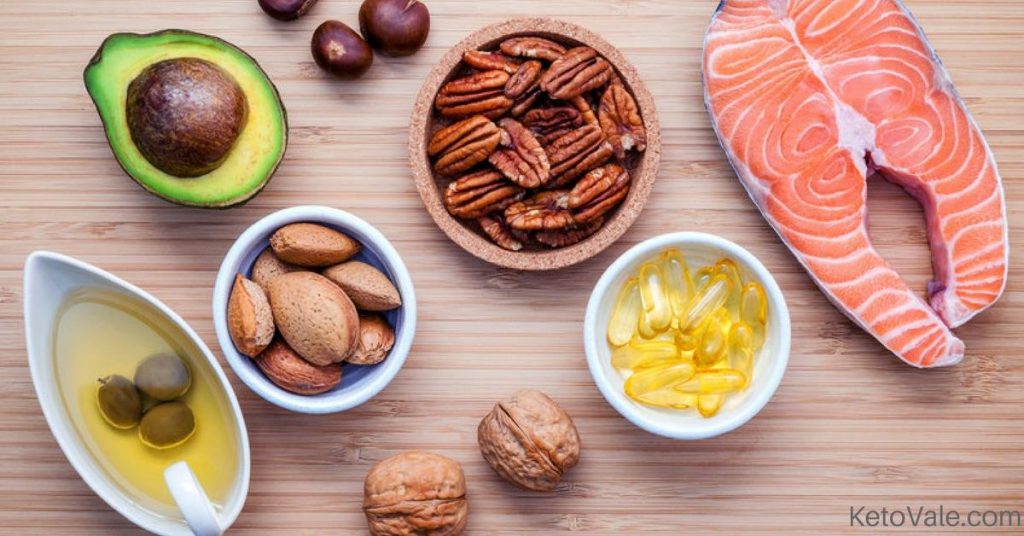A low-carb ketogenic diet is known to improve your cholesterol levels and can be an incredibly healthy choice. In fact, we published an article before to explain how keto diet can lower your LDL cholesterol and triglycerides levels (1, 2, 3).
However, there appears to be a very small number of people who experience increased cholesterol levels on a ketogenic diet during the first few months despite the weight loss. This could be just a temporary side effect. We will explain more and show you some studies we have found below.
Difference between “good” HDL-cholesterol and “bad” LDL-cholesterol?
Lipids are types of fats and the two most known types are triglycerides and cholesterol. Lipoproteins are the proteins which transfer the lipids in the bloodstream and handle their chemical reactions.
High-Density Lipoprotein Cholesterol (HDL-cholesterol) is often called the “good” cholesterol that takes the excessive cholesterol from the blood to the liver for removal.
Low-Density Lipoprotein Cholesterol (LDL-cholesterol) is often called the “bad” cholesterol which transfers the cholesterol to the bloodstream to repair cells and also deposits cholesterol on the inside of artery walls.
Total cholesterol is HDL and LDL cholesterol combined (4).
Cholesterol Levels Might Increase While Losing Weight
It is not uncommon for the cholesterol levels to increase temporarily in the first few months of the ketogenic diet. The reason is that weight loss itself can cause a temporary increase in cholesterol levels.
When you lose fat weight, your body burns its stored fat and releases fatty acids into your bloodstream. This can cause an increase in your LDL cholesterol levels. This is usually only temporary. Cholesterol levels return to normal or even improve after the weight reduction has been stabilized.
Let’s look at the following studies we have found that show this temporary rise of cholesterol phenomenon when losing weight:
A study among 66 obese women showed that in the first period of the diet program, between the 2nd and 6th month, they experienced an average weight loss of 16.4% but their total cholesterol levels increased by 4.2%, and their LDL cholesterol increased by 4.5% (5).
Another study examining the effects of a ketogenic diet (30% protein, 8% carbohydrate and 61% fat) among 12 healthy, non-obese men also demonstrated similar results. The average LDL-cholesterol levels before the participants started the diet were 2.87 mmol/L, they increased to 3.22 mmol/L during the third week of the diet and by the end of week 6, the LDL-cholesterol levels were back to normal (6).
A clinical trial among epileptic children also showed that a regime of the ketogenic diet for 6 months resulted in increased mean LDL cholesterol levels, elevated triglyceride levels and decreased HDL-cholesterol levels. However, the authors suggested that high cholesterol levels could have been caused by antiepileptic medications as well (7, 8).
Rapid weight loss, especially if it derives from fasting may cause an increase in apolipoprotein B and LDL-cholesterol levels. This could occur because when people fast, they diminish their energy levels, thus decrease their insulin production, which leads to higher LDL-cholesterol generation (9).
Another great example of a brief elevation in LDL cholesterol levels followed by a rapid decrease is provided by a 2-year dietary-intervention clinical trial comparing effects of a low-fat diet, a Mediterranean diet and a low-carbohydrate diet among 322 moderately obese adults (10).
As it can be observed in the image below, people following the low carb diet experience a small increase in their LDL cholesterol levels, which however only last 6 months.
By the end of the 2-year trial, participants receiving low-carbohydrate diet report a mean decrease in their LDL-cholesterol by 3mg/dl, a mean increase of HDL-cholesterol levels by 8.4mg/dl, a mean triglyceride reduction of 23.7mg/dl and also a decrease in the total cholesterol/HDL-cholesterol ratio by 1.1%.
Graph 1: Lipid Profiles of participants during the 2-year clinical study

Image Credit: Shai, I et al.2008 – Source: N Engl J Med 2008
Bottom line: As you can see from the graph above, you might experience a slight increase in cholesterol during the first 6 months on a low carb diet. Your LDL cholesterol levels will lower after that, based on the study above.
Why Does Cholesterol Increase?
Although the exact mechanism is not clear, a temporary increase of cholesterol is associated with the accumulation of fat in the body. Following a ketogenic diet, a diet low in carbohydrates and high in fat results in higher fatty acids intake. Utilising fat as an energy fuel is a process called lipolysis (11).
Specific fatty acids which derive from dietary fat consumption, known as chylomicron triglyceride-fatty acids, do not become oxidized immediately in order to become energy but they are stored in the adipose tissue, which is no other than the fat stored in your body.
Normally, fatty acids are oxidized to become energy with the help of some hormones, but insulin prevents lipolysis and hampers the breakdown of adipose tissue. This results in free fatty acids being released into the bloodstream which leads to an accumulation of triglycerides. Higher levels of triglycerides are also associated with higher levels of LDL-cholesterol and lower levels of HDL-cholesterol (12).
In other words, keto diet is rich in fat which in the beginning is not oxidized but flow free in the bloodstream. This results in higher concentrations of triglycerides and small LDL particles (13).
Blood tests interpret these elevations as increased cholesterol levels, which however is not always correct.
Nonetheless, this initial increase in LDL cholesterol is caused by the sudden weight loss and the inability of the human body to adapt quickly to lipolysis.
As soon as the body adapts to the new regime, meaning using fat as energy fuel compared to carbohydrates, the cholesterol not only will return to normal levels but will also improve.
What Should I Do If My Cholesterol Levels Go Up?
This phenomenon of higher cholesterol levels is only temporary and does not occur to everyone.
It is more common among people with excessive levels of insulin in their blood (hyperinsulinemia), reduced clearance of insulin by the liver and increased triglyceride production (hypertriglyceridemia) (14, 15, 16).
Nonetheless, there are some steps you can take to ensure that your cholesterol levels do not fluctuate.
Changing your fat intake from saturated fats to polyunsaturated fats (olive oil, salmon, avocado, nuts, etc…) will produce greater level of ketosis, improve insulin sensitivity and will not affect negatively the levels of cholesterol.
Moreover, a polyunsaturated fat enriched keto diet is beneficial and safer for long-term compared to a saturated fat-enriched keto diet (17).
Also, are you taking any medication along with your keto diet? If you do, make sure to ask your doctor about the effect of those drugs on your cholesterol levels. It could be the medication, not keto diet, that cause a spike in your cholesterol.
Furthermore, aerobic exercise can help inhibit cholesterol increase while on a keto diet. The keto diet together aerobic workout can lead to reduced body weight, lower systolic blood pressure and improved cholesterol levels. Additional, aerobic exercises enhance cardiac fitness and improve health in general (18).
Bottom line: When you are losing fat on a ketogenic diet, your cholesterol numbers might increase temporarily. The cholesterol levels might return to normal after 6 months as mentioned in one of the studies above. Try to eat a cleaner version of keto (ie. eat more healthy fats) or try a dairy free keto meal plan and get your blood tests done again to check the numbers. It also helps if you can discuss your situation with a professional doctor who also has experience in low carb diets to give you better advice for what to do.







